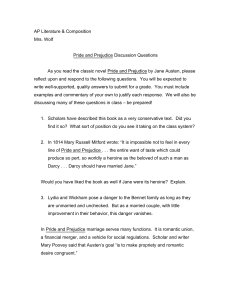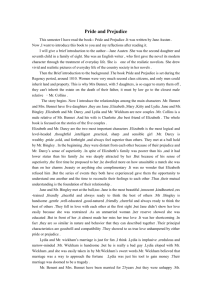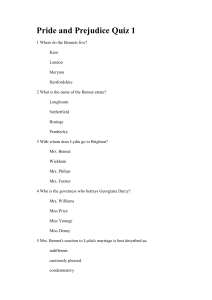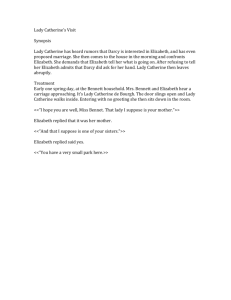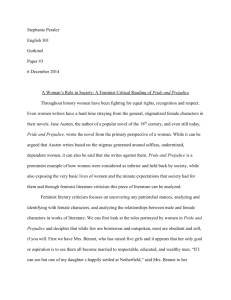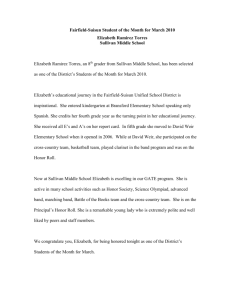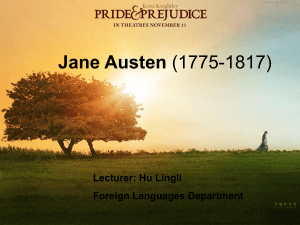prideandprejudice.doc
advertisement
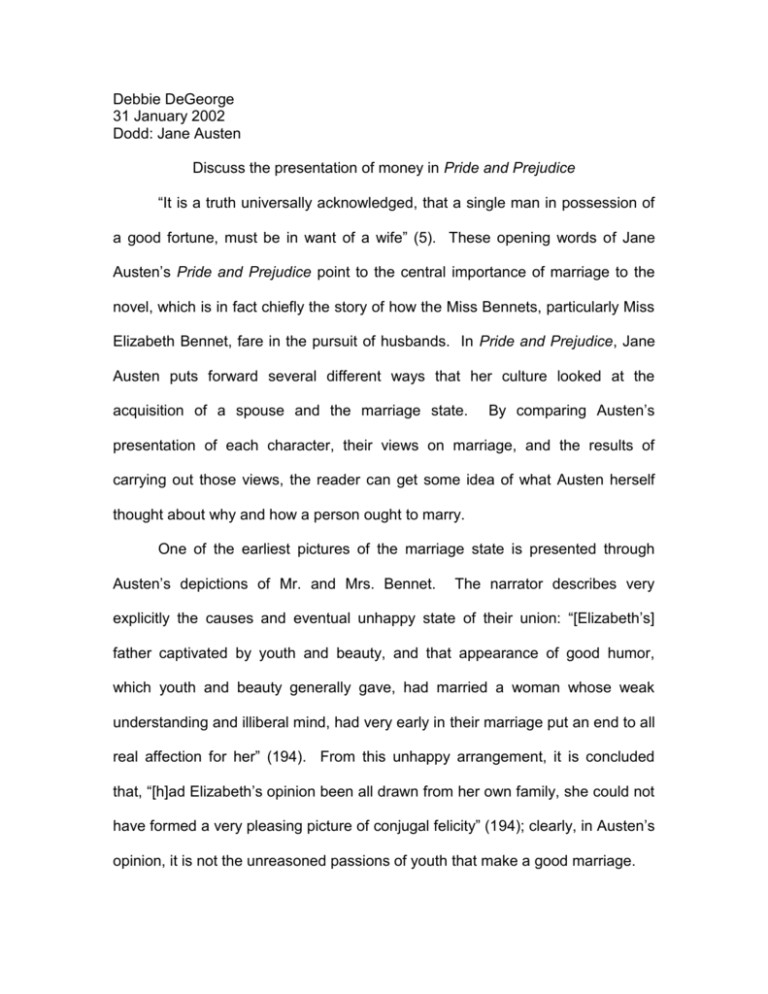
Debbie DeGeorge 31 January 2002 Dodd: Jane Austen Discuss the presentation of money in Pride and Prejudice “It is a truth universally acknowledged, that a single man in possession of a good fortune, must be in want of a wife” (5). These opening words of Jane Austen’s Pride and Prejudice point to the central importance of marriage to the novel, which is in fact chiefly the story of how the Miss Bennets, particularly Miss Elizabeth Bennet, fare in the pursuit of husbands. In Pride and Prejudice, Jane Austen puts forward several different ways that her culture looked at the acquisition of a spouse and the marriage state. By comparing Austen’s presentation of each character, their views on marriage, and the results of carrying out those views, the reader can get some idea of what Austen herself thought about why and how a person ought to marry. One of the earliest pictures of the marriage state is presented through Austen’s depictions of Mr. and Mrs. Bennet. The narrator describes very explicitly the causes and eventual unhappy state of their union: “[Elizabeth’s] father captivated by youth and beauty, and that appearance of good humor, which youth and beauty generally gave, had married a woman whose weak understanding and illiberal mind, had very early in their marriage put an end to all real affection for her” (194). From this unhappy arrangement, it is concluded that, “[h]ad Elizabeth’s opinion been all drawn from her own family, she could not have formed a very pleasing picture of conjugal felicity” (194); clearly, in Austen’s opinion, it is not the unreasoned passions of youth that make a good marriage. The inequality of the union is evident in almost every exchange between Mr. and Mrs. Bennet throughout the book; Mr. Bennet continually plagues and teases his wife, and Mrs. Bennet’s inferior understanding does not equip her to combat or even to recognize his wit. As a result, Mr. and Mrs. Bennet must rely not on the comforts of marital companionship, but on other pursuits for happiness. Mr. Bennet, “fond of the country and books” (194), finds most of his comfort in his library and property, away from the nuisance of his wife. Mrs. Bennet, on the other hand, occupies herself with more social pursuits. “The business of her life was to get her daughters married; its solace was visiting and news” (7). Though the way she carries out the business of finding husbands for her children is often embarrassing and repulsive to the more sensible of her daughters, this effort does turn out to be an important one. Mr. Bennet’s estate, though a fairly valuable one, is “entailed in default of heirs male, on a distant relation; and their mother’s fortune, though ample for her situation in life, could but ill supply for the deficiency of his” (27). Despite Mrs. Bennet’s clear misunderstanding of what an entail is, she understands the result: her daughters will be poor if they do not find husbands. In light of this, the reader can better understand the weight of Mrs. Bennet’s words when, on the arrival of Mr. Bingley in the neighborhood, she exclaims, “A single man of large fortune. . . . What a fine thing for our girls!” (5). Her goal in marrying off her daughters, therefore, seems primarily to be to secure their financial comfort. Securing comfort through marriage, indeed, seems to be an important concern throughout Pride and Prejudice, and it is most clearly fleshed out in the actions of Charlotte Lucas in her courtship with and marriage to Mr. Collins. Still unmarried at 27, Charlotte’s views on matrimony are highly practical; “[marriage] was the only provision for well-educated women of small fortune, and however uncertain of giving happiness, must be their pleasantest preservative from want” (103). She expresses this view freely to Elizabeth when they are discussing Jane’s attachment to Mr. Bingley and advises that Jane make every effort to secure an engagement to her as soon as she can: “In nine cases out of ten, a woman had better show more affection than she feels. . . . When she is secure of him, there will be leisure for falling in love as much as she chuses” (21-22). Though Elizabeth retorts against this, saying that Charlotte would never practice such a philosophy, Charlotte proves to be more faithful to her beliefs than Elizabeth gives her credit for, as her eventual marriage to the ridiculous but well-situated Mr. Collins proves. Though Elizabeth is appalled that her friend would marry someone so inferior to her in sense, marrying a sensible man never seems to have been one of Charlotte’s aims. “I am not romantic you know,” she reminds Elizabeth. “I ask only a comfortable home” (104). And that, it seems, she does acquire in some measure. Though she and her husband attain no great level of mutual understanding, on Elizabeth’s visit to the Collinses proves that, as mistress of her own home, Charlotte has achieved a fair degree of happiness: [The house] was . . . well built and convenient; and everything was fitted up and arranged with a neatness and consistency of which Elizabeth gave Charlotte all the credit. When Mr. Collins could be forgotten, there was a great air of comfort throughout, and by Charlotte’s evident enjoyment of it, Elizabeth supposed he must be often forgotten (131). The only clear judgment we get on Charlotte’s marriage of practicality comes through the mouth of heroine Elizabeth Bennet. Though initially the union horrifies her and causes her to lose a degree of respect for Charlotte, her final pronouncement after her stay with the Collinses is mixed. She clearly continues to pity her friend; on departing she laments having to leave “poor Charlotte” in “such society” (178). However, she is forced to acknowledge that Charlotte, “though evidently regretting that her visitors were to go, . . . did not seem to ask for compassion. Her home and her housekeeping, her parish and her poultry, . . . had not yet lost their charms” (178). Therefore, though Charlotte’s comfortcentered marriage is not praised, neither does it seem to be fully condemned. The marriage most condemned by the novel is by far the union between Lydia and George Wickham, a marriage that is begun in unrestricted passion and completed with a mercenary exchange. Lydia’s letter upon their elopement reveals the degree to which she is ruled by her own fleeting passions; though only a short time before she had shown no real preference for Wickham, in the letter she announces, “I should never be happy without him, so I think it no harm to be off” (236). And without the virtue or sense to curb her preferences, she is soon convinced not to marry Wickham, but to live with him unmarried. On Wickham’s side the offense is worse, for the reader knows that his action is only one in a series of intemperate and licentious actions. In addition, his intentions toward Lydia prove to have been entirely dishonorable, a seduction made agreeable by his need to flee his debts. On contemplating her sister’s elopement, Elizabeth concludes that it “had been brought on by the strength of [Lydia’s] love, rather than by [Wickham’s]; . . . [H]is flight was rendered necessary by the distress of circumstances; and if that were the case, he was not the young man to resist the opportunity of having a companion” (256). Ultimately, Wickham is only brought to marry Lydia, not by any passion or love, but out of concern for his own financial troubles. He agrees to marry Lydia only on the condition that her family pay his debts. Elizabeth’s lamentations over this marriage of foolish passion and mercenary self-interest reveal Austen’s opinion of a union based on such shaky ground: “And for this we are to be thankful. That they should marry, small as is their chance of happiness, and wretched as is his character, we are forced to rejoice!” (245). But there is another aspect beyond motivation that makes Lydia and Wickham’s marriage especially reprehensible: its disregard for social and moral propriety. Though both the Bennet marriage and the Collins union are based on what might be considered ill or insufficient motives, both take place within the proper channels of societal convention and are therefore less damaging than the actions of Mr. and Mrs. Wickham. Lydia and Wickham’s behavior, however, sets them up not just for domestic unhappiness but for public disgrace, a shame that extends to the entire Bennet family as well; as Mr. Collins writes in his letter of consolation to Mr. Bennet, “this false step in one daughter will be injurious to the fortunes of all the others” (240). Austen, then, makes a clear distinction between the foolish marriage and the immoral union; while unequal partnerships can be destructive to happiness, they are not uncommon, and are frequently overcome; it is only the immoral union that can deal a death blow to marital contentment. What, then, is comprised in the ideal union? Clearly it comes neither from mere passion, nor from practical considerations alone. In her introduction to Pride and Prejudice, Vivien Jones defines the ideal marriage as one that brings about what she terms “rational happiness,” which she defines as “marriage envisaged as a balance of moral and personal qualities, as a fulfilling process of mutual improvement” (ix). This kind of union, according to Jones, does not disregard either the demands of the heart or financial considerations, and is the kind made by Darcy and Elizabeth at the end of the novel. According to Jones, Austen believed that both the demands of the heart and the constraints of society must be considered for rational happiness to be achieved. A balance between these two demands is clearly present in the union of Darcy and Elizabeth, who, while thwarting many of the expectations of society, do not break the cultural and moral codes of propriety: At one level, we are simply being persuaded that two particular individuals are right for each other, that – against all the social odds – Fitzwilliam Darcy is ‘exactly the man,’ the only man, who could have satisfied Elizabeth Bennet’s emotional needs. . . . On the other hand, Elizabeth’s and Darcy’s unorthodox relationship is very explicitly distinguished from the shocking impropriety of Lydia’s irresponsible attachment to Wickham. (x). This difference is not only evident in the practical contrast between Darcy and Elizabeth’s period of engagement, spent among friends and family at Longbourn, and Wickham and Lydia’s elopement and makeshift wedding. The source of their passions is also quite different. Compared to Lydia’s ill-informed and short-lived passions, both Darcy and Elizabeth’s feelings have been subjected to both rational contemplation and the test of time. Though it takes Elizabeth months to come to love Mr. Darcy, when she finally does her regard is inwardly expressed in highly reasoned terms: “It was a union that must have been to the advantage of both; by her ease and liveliness, his mind might have been softened, his manners improved, and from his judgment and knowledge of the world, she must have received benefit of greater importance” (252). Darcy, too, though in his first proposals he voices many rational disapprovals to his own judgment in choosing Elizabeth, also comes to recognize over time the benefit to his mind and character that must come from their marriage. By the second proposal, he has already seen the good effects of Elizabeth’s company and advice upon him, as she has taught him to overcome much of his selfishness and pride. “You shewed me,” he tells Elizabeth, “how insufficient were all my pretensions to please a woman worthy of being pleased” (297). It is important, however, not to leave monetary considerations out of the discussion of Elizabeth and Darcy’s happiness in marriage. To be sure, money is not the chief object for either of the two in marrying one another, certainly not for Darcy. But Elizabeth, whose fortune is scant, money must necessarily be a consideration. Mrs. Gardiner, Elizabeth’s aunt, knows this, and her advice to Elizabeth on that head can serve as a center for an examination of the influence of money on Elizabeth’s choice. Early in the novel, when Mrs. Gardiner perceives in Elizabeth a preference for George Wickham, she cautions Elizabeth against an unwise attachment. “Do not involve yourself,” she advises, “or endeavor to involve him in an affection which the want of fortune would make so very imprudent” (122). Though Elizabeth makes no promises, she duly acknowledges her aunt’s advice; it is not until Wickham begins to slight her in pursuit of Miss King and her ten thousand pounds that the topic is revived, and the advice challenged. “I should be sorry to think our friend mercenary,” Mrs. Gardiner declares, and immediately Elizabeth senses the inconsistency. “Pray, my dear aunt,” she asks, “what is the difference in matrimonial affairs between the mercenary and the prudent motive? . . . Last Christmas you were afraid of him marrying me, because it was imprudent; and now . . . you want to find out he is mercenary.” Mrs. Gardiner never answers the question directly; however, she replies by stating simply: “If you will only tell me what sort of girl Miss King is, I will know what to think” (128). Neither does Austen answer the question directly, but, like Mrs. Gardiner, in the case of Elizabeth the reader can tell the difference. One feels that Elizabeth is only half-joking when she teasingly tells Jane that her affection began upon “first seeing his beautiful grounds at Pemberly” (301). Her tour of Pemberly, indeed, seems to have a strong effect on her mind; as she walks about the rooms, she cannot help but think that, “instead of viewing them as a stranger,” she “might have rejoiced in them as [her] own” (202). But it is clear that by far the strongest effect of the tour is to produce in her a stronger and more admirable picture of its master’s character; through the descriptions of his housemaid and her encounter with Darcy himself, she becomes increasingly convinced of his goodness and generosity. Elizabeth, then, is not mercenary, not because she does not consider money, but because she considers the man first. “For Jane Austen freedom is only authentic when given a proper social context,” says Alistar Duckworth in The Improvement of the Estate. “This is not to say that social position for Jane Austen inevitably confers personal worth. . . . It is to argue that Jane Austen affirms a positive interpretation of the social role” (128). Without acknowledgement society and its reasonable constraints, Austen seems to argue that it is very difficult to find happiness. Though a Charlotte Lucas might find peace and contentment in her home, a Lydia Bennet is very unlikely to do so. At the same time, however, she also makes it clear that an overacknowledgement of social customs and lifeless traditions, without an allowance for love and genuine affection, is also unable to produce great happiness. Rather, it is through a rational concern for both society and individual needs and desires that marital happiness is most likely to be found.
